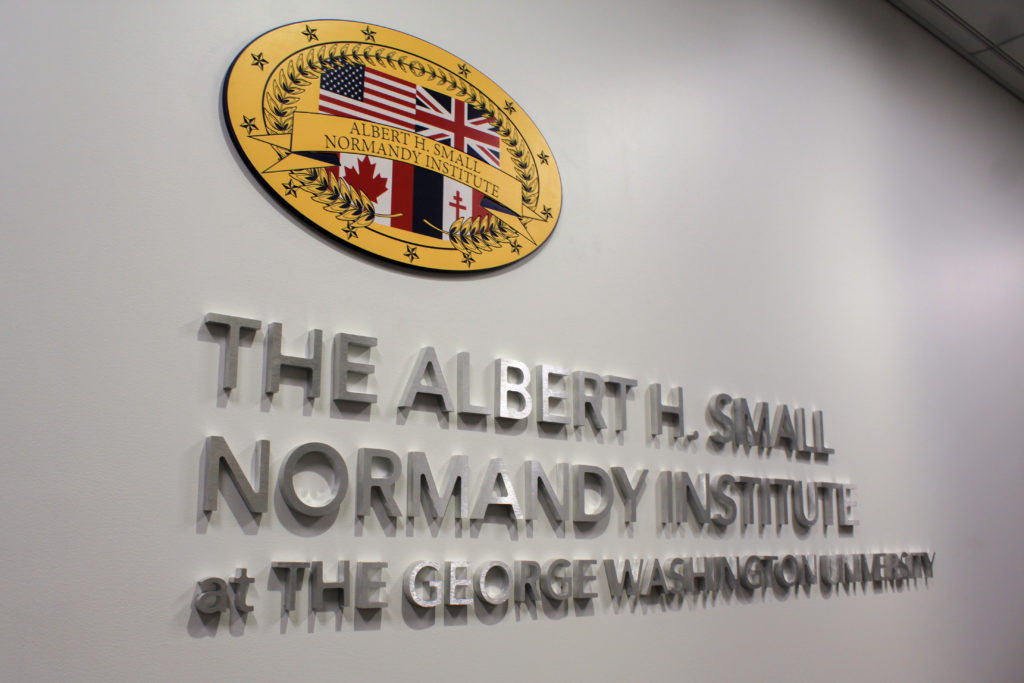An institute focused on commemorating D-Day will use its new space in Phillips Hall to expand its presence on campus, the center’s faculty said.
The inaugural space was unveiled Jan. 15 to house the Albert H. Small Normandy Institute – established in 2011 to honor the lives of American soldiers who died in France on D-Day in 1944 – following a donation from the institute’s namesake, a donor who funded its creation. Faculty said the institute’s new space will allow it to expand its capabilities to hold programming for interested scholars, faculty and students.
Charles Long, the academic director of the institute and an assistant professor of history, said the institute’s new space in Phillips Hall guarantees it will be able to fulfill its mission of educating people about one of the most significant days in World War II in addition to allowing more students to participate in the program by centralizing its operations.
“I think that having a physical location here will guarantee that it will continue in perpetuity, which is I know what Mr. Small wanted,” he said.
The institute’s leaders send 15 teams of high schoolers and their teachers annually to Normandy – the landing site where Allied troops invaded Nazi-occupied Europe during the war – to view key sites from that time period and give graveside eulogies to a specific fallen soldier buried there, according to their website. Those involved participate in online discussions and research their own soldier over the course of the program, which lasts several months, the website states.
Long said three student participants from the program in years past have attended GW for college. He said the space on the third floor of Phillips – which students will engage with when they visit the District prior to traveling to France in June – may entice more students participating in the program to join GW.
He said students and their teachers go to the National Archives in College Park, Maryland, to research the soldier whose life they have chosen to examine.
“I think that’s the biggest advantage of having the institute here and based at GW,” he said. “I know Mr. Small wants it to be a rigorous academic program and he wants it to be run by GW professors.”
He said leaders of the institute use podcasts as a way to spread information to participants in the program. He said he has recorded three episodes and will soon record a podcast on the Battle of the Atlantic, a monthslong campaign during World War II over control of Atlantic sea routes, for the current participants in this year’s cohort.
He added that professors in departments like history and American studies, including Katrin Schultheiss, the chair of the history department, and Steven Brady, an assistant professor of history, will record episodes on topics like France’s role in the war for the students.
“We’re using a really broad cross-section of faculty from the University, and I think having a base here gives something to focus on,” Long said.
He said the institute’s main area of focus at the moment is the high school cohort but added that he is open to expanding the institute’s offerings with more discussions in the future with a new home.
Long said he and other leaders recently met with a member of the World War II Museum in New Orleans who is interested in holding a symposium at the institute, and he is considering inviting guest speakers to give lectures on related topics.
“The time will probably come when there are more activities centered around the institute than there are,” he said. “So far there never had been before, but it never really had a home before.”
Long’s office is located in the center itself, and his associates’ offices are located just outside the institute on the same floor of Phillips, according to the history department’s website.
Denver Brunsman, a deputy academic director for the institute and an associate professor of history, said having a physical space on campus is not “absolutely necessary” for all centers and institutes at GW, but it helps organize the institute’s administrative unit.
“I think that everyone’s very excited to have an institute here in the space because I think it shows an investment in GW,” Brunsman said. “It will be located here.”
Eric Arnesen, a deputy academic director and a professor of modern American labor history, said the location will be a central space for the institute’s leaders to field any questions anyone has related to the institute’s mission or its work.
He said students in Long’s class at GW on the Normandy invasion can volunteer with the center to serve as mentors for the high school-level program and help high school students conduct research.
“I think it anchors the whole concept,” Arnesen said. “I think it’s good to have this. Involving GW students is one of the purposes of the institute. Our students are wonderful – they are a resource.”
Arnesen said members of the institute have begun talking with potential partners about featuring more academic programming based on World War II and “D-Day-specific experiences.”
“One of the nice things about having a physical home and having a clear identity is that now affords us an opportunity to think more creatively about what more can we be doing, what direction should we go and what avenues might we explore,” he said.





